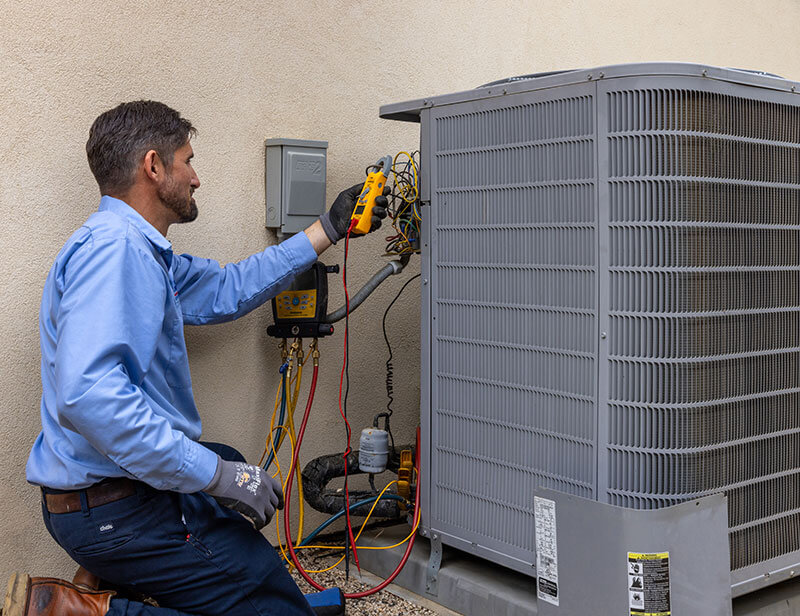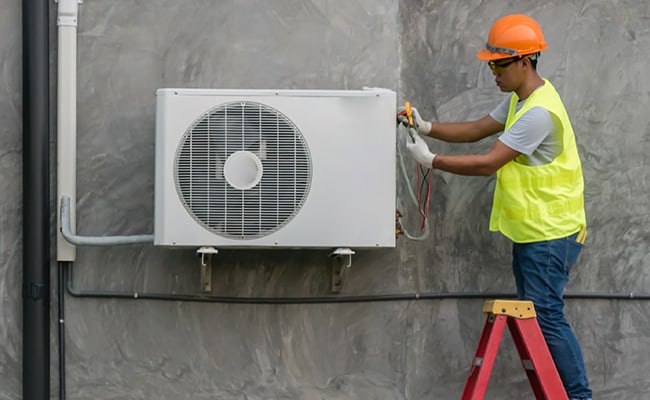Highly Rated Pros for heat pump replacement ooltewah tn
Highly Rated Pros for heat pump replacement ooltewah tn
Blog Article
Picking In Between a Heatpump and Furnace: Trick Factors To Consider for Your HVAC Demands
When examining home heating alternatives for cooling and heating needs, the decision between a heatpump and a heater can be intricate. Each system supplies distinctive advantages customized to details environments and power performance objectives. Recognizing these distinctions is important for making an educated selection. Trick factors such as installation prices and environmental influence better complicate the option procedure. Which option truly straightens with one's convenience and sustainability choices? The complying with sections will check out these factors to consider thoroughly.
Comprehending Warmth Pumps: Just How They Work and Their Benefits
While lots of property owners take into consideration numerous home heating choices, recognizing exactly how heatpump function and their benefits can considerably influence their choice. Heatpump operate by moving heat instead than creating it. In the winter months, they remove heat from the outside air or ground and move it inside your home, while in the summertime, they reverse this procedure, cooling the home by expelling heat outside. This twin performance makes them flexible for year-round climate control.One of the key advantages of heat pumps is their power efficiency. They make use of substantially much less electrical power contrasted to standard heater, potentially leading to lower energy expenses (heat pump installation ooltewah tn). Furthermore, heatpump have a smaller carbon impact, making them an eco pleasant selection. They also call for less upkeep than conventional systems, contributing to long-term cost savings. Overall, understanding the mechanics and advantages of heat pumps can assist property owners make notified decisions regarding their home heating and cooling down demands
Checking Out Heating Systems: Types, Operation, and Benefits
Heating systems come in various types, consisting of gas, electric, and oil designs, each with unique functional systems. Understanding these differences is essential, as they affect efficiency and heating performance. Additionally, furnaces provide many advantages, such as consistent heat output and dependability in cooler environments.
Sorts of Heating systems
Furnace can vary substantially in style and operation, with heaters being a preferred option among property owners. There are several types of heating systems, each making use of different fuel resources and modern technologies. Gas heating systems are typical, leveraging natural gas to create heat efficiently. Electric furnaces, on the various other hand, make use of electrical resistance to create heat, usually preferred for their simple installation. Oil heaters, while much less typical, are effective in locations with limited gas accessibility (heat pump service). In addition, condensing heating systems take full advantage of power performance by recording and recycling exhaust gases. Each kind runs through a system of heat exchangers and ductwork to disperse cozy air throughout a home. Comprehending the distinctions in between these heating system types is important for notified heating and cooling decisions
Advantages of Furnaces
For homeowners looking for reputable heat throughout chilly months, the benefits of furnaces are significant. Furnaces offer regular heating, ensuring even temperatures throughout the home. They are especially reliable in extreme cool, frequently outmatching warmth pumps in freezing problems. Different types, including gas, electric, and oil heaters, use versatility to meet diverse needs and preferences.Furnaces likewise have a tendency to have reduced preliminary setup prices contrasted to heat pumps, making them an extra available choice for many. Their durable design contributes to a much longer life-span, with lots of systems lasting over 15 years with proper upkeep. Furthermore, modern-day heating systems are often outfitted with advanced innovation for boosted performance, which can result in minimized energy bills. On the whole, heaters stay a dependable option for reliable home heating.

Power Performance: Contrasting Heat Pumps and Furnaces
When contrasting power effectiveness between warm pumps and heating systems, the Seasonal Power Performance Ratio (SEER) plays an essential duty in determining performance. In addition, a functional cost analysis discloses the long-term financial implications of each system. Recognizing these elements can lead homeowners in making notified decisions regarding their home heating services.
Seasonal Power Effectiveness Proportion
Power effectiveness plays a necessary function in the decision-making process in between heat pumps and heaters, specifically when taking into consideration the Seasonal Power Effectiveness Proportion (SEER) This statistics measures the cooling performance of heatpump over a whole cooling season, providing a standard way to examine performance. Greater SEER rankings show greater power effectiveness, equating to lower energy usage and reduced energy bills. On the other hand, heating systems are commonly evaluated making use of the Annual Gas Application Effectiveness (AFUE) score, which shows heating effectiveness. When contrasting these two systems, homeowners must prioritize SEER ratings for warmth pumps, as they directly impact general power financial savings and environmental sustainability. A detailed understanding of SEER can notably affect the long-lasting fulfillment and cost-effectiveness of the picked cooling and heating solution.
Functional Expense Evaluation
Comprehending the functional prices connected with heat pumps and furnaces is essential for house owners evaluating their choices. Heatpump commonly offer higher power effectiveness, converting heat pump installation ooltewah tn electric energy into heat with marginal waste. This leads to lower regular monthly energy bills, particularly in moderate environments. Conversely, standard furnaces, specifically gas designs, may have reduced in advance prices however can incur greater operational expenses over time because of fuel rates and efficiency ratings.Moreover, heatpump can operate as both home heating and cooling systems, potentially decreasing the demand for separate heating and cooling systems. While initial investments for heatpump may be higher, their lasting savings in energy performance can make them an extra economical option for numerous houses. Careful analysis of local power prices is necessary to establish the best alternative.
Setup Costs: What to Anticipate for every Home Heating System
Setup prices for furnace can differ substantially in between heatpump and furnaces, influencing homeowners' decisions. Warm pumps generally have higher ahead of time installment prices, generally varying from $3,500 to $8,000, depending on the device dimension and intricacy of installation. This consists of the exterior system, interior handling system, and necessary ductwork adjustments. On the other hand, furnaces have a tendency to have lower preliminary expenses, balancing in between $2,500 and $6,000, which can be appealing for budget-conscious house owners. Nevertheless, setup costs can enhance if considerable ductwork is required.Moreover, the selection of gas type for heating systems-- gas, propane, or electrical-- can additionally affect setup expenses. While warmth pumps provide power efficiency, their initial investment might discourage some buyers. Inevitably, examining installment prices along with long-lasting financial savings and efficiency will assist home owners in making educated decisions regarding their heating unit.
Environment Factors To Consider: Which System Executes Better in Your Area
Just how do climate problems influence the efficiency of heating systems? The efficiency of heatpump and heaters can differ substantially relying on the neighborhood environment. In moderate climates, heatpump succeed by effectively moving warmth from the outdoors air, making them an energy-saving option. Their effectiveness decreases in incredibly cool temperature levels, where they may battle to extract adequate warm. On the other hand, heaters, particularly gas versions, give dependable and consistent warmth no matter outside problems, making them preferable in colder regions.In areas that experience milder winters months, heat pumps can run effectively year-round, giving both heating & cooling. On the other hand, regions with severe wintertimes typically benefit from the robustness of heaters. Eventually, understanding the local climate is essential when choosing in between a heat pump and a heater, as it directly impacts their operational effectiveness and total his explanation performance.
Upkeep Needs: Long-Term Take Care Of Heat Pumps vs. Furnaces
While both heat pumps and furnaces need routine upkeep to assure peak efficiency, their certain needs and treatment regimens vary substantially. Heating systems commonly require less regular attention, with annual inspections being sufficient to inspect for gas leaks, clean filters, and examine overall performance. Their simpler design usually enables simple repairs.In comparison, heatpump necessitate biannual upkeep due to their dual role in home heating and cooling. This includes cleansing coils, inspecting refrigerant degrees, and ensuring that both the exterior and interior units work at their finest. In addition, warmth pump upkeep often involves more elaborate elements, making professional servicing essential.Neglecting upkeep can bring about lessened efficiency and boosted power expenses for both systems. Ultimately, homeowners ought to take into consideration these lasting care requirements when selecting between a heatpump and a furnace, as aggressive maintenance can prolong the life-span and performance of either system significantly.
Environmental Impact: Selecting a Lasting Heating Option
The environmental effect of heater is an essential assessment for homeowners seeking lasting alternatives. Heat pumps are generally more energy-efficient than standard heating systems, as they move heat instead of create it, substantially lowering carbon exhausts. By using renewable resource resources, such as geothermal or air-source heatpump, homeowners can additionally decrease their ecological footprint.On the various other hand, gas heaters give off greenhouse gases and add to air contamination, though they usually give greater heat output. Nonetheless, improvements in innovation have led to the development of high-efficiency furnaces that lessen emissions.Ultimately, picking a heating unit entails evaluating performance versus ecological effect. Property owners are urged to review local energy resources and motivations for renewable systems, guaranteeing a choice that aligns with both individual convenience and environmental duty. The decision affects not only immediate convenience yet also long-term sustainability and environmental health and wellness.
Regularly Asked Inquiries
Just How Long Do Warm Pumps and Furnaces Commonly Last?
The lifespan of heatpump typically varies from 15 to two decades, while heaters click for source can last between 15 to 30 years. Normal upkeep significantly affects their durability and effectiveness in supplying heating services.
Can I Use a Heatpump in Extremely Cold Climates?
Heatpump can run in very cold climates, however their performance diminishes as temperatures decrease. In such problems, supplemental heating sources might be essential to maintain comfortable indoor temperatures and ensure peak efficiency.

What Is the Noise Degree of Warm Pumps Versus Furnaces?
The noise levels of warm pumps and heating systems vary substantially. Normally, heatpump run more silently than standard heating systems, making them preferable for those delicate to seem, while heaters might produce louder functional noises throughout home heating cycles.
Are Warm Pumps Suitable for Both Heating & Cooling?
Heat pumps are undoubtedly suitable for both cooling and heating (ductless mini splits). They operate by transferring warm, providing reliable temperature control year-round, making them a flexible selection for property owners looking for an all-in-one heating and cooling remedy
What Size Heater Do I Required for My Home?
Establishing the ideal size heating system for a home calls for examining factors such as square video footage, insulation high quality, local environment, and the home's format. Consulting a professional can ensure an exact evaluation and suitable convenience. Warm pumps normally provide higher energy efficiency, converting electrical power right into warm with very little waste. In moderate environments, warmth pumps stand out by efficiently moving heat from the outside air, making them an energy-saving alternative. Conversely, furnaces, specifically gas models, give dependable and consistent warmth no matter of outdoor problems, making them better in cooler regions.In areas that experience milder winters, heat pumps can run properly year-round, giving both home heating and air conditioning. Heat pumps are typically more energy-efficient than standard heating systems, as they transfer warmth rather than generate it, greatly decreasing carbon exhausts. By making use of eco-friendly power sources, such as air-source or geothermal warm pumps, homeowners can further decrease their environmental footprint.On the other hand, all-natural gas heaters emit greenhouse gases and contribute to air pollution, though they usually supply higher heat outcome.
Report this page